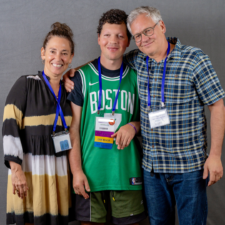Adults with Lennox-Gastaut Syndrome
Adults living with LGS often have complex needs that require comprehensive care and community support. A knowledgeable and dedicated multidisciplinary team of family members/legal guardians, medical professionals, and social service specialists are essential in meeting these needs. Planning for the…
More
For Healthcare Professionals
Collaborating to Advance LGS Care & Research
At the LGS Foundation, we recognize the power of collaboration between expert neurologists, epileptologists, neurosurgeons, neuroscientists, and allied health professionals. Together, we are accelerating diagnoses, improving access to comprehensive treatment options, and empowering families with personalized care plans—ultimately enhancing quality…
More
Clinical Trials in LGS
What is a Clinical Trial? Clinical trials and research studies are done to scientifically evaluate a medical or surgical intervention. They are the primary way that researchers find out if a new treatment, like a new drug, diet, surgery, or…
More
How is LGS Treated?
There is no cure for LGS but numerous treatments for seizures are available. The goal of seizure treatment in LGS is to minimize the seizures, treatment side effects, and the number of medications as well as to attain the best…
More
What is the Relationship between LGS and Infantile Spasms?
1 in 3 Children with LGS had Prior Infantile Spasms (IS). The LGS Foundation is committed to providing education and increasing awareness of Infantile Spasms (IS). Infantile Spasms typically occur before one year of age and affect approximately 2,500 children…
More
How Many People Have LGS?
Who has LGS? 1-2% of all people with epilepsy have LGS 3-4% of all children with epilepsy have LGS 48,000 children and adults in the U.S. have LGS 1,000,000 children and adults have LGS worldwide LGS is typically diagnosed between…
More
Glossary of Terms
A Absence seizure A seizure causing a brief loss of awareness, which is often characterized by staring into space for a few seconds. Other symptoms include lip-smacking, eyelid fluttering, and chewing motions. Adjunct Treatment An adjunct treatment is one used…
More
What is Lennox-Gastaut Syndrome?
LGS is tough. So are we! As you read about LGS, please remember that you are not alone. Lennox-Gastaut Syndrome (LGS) is a severe epilepsy syndrome that develops in young children and often leads to lifelong disability. Nobody is born…
More
What causes LGS?
In LGS, the brain is affected at a critical time in its development. Learning problems and seizures result. There are many causes of seizures that can evolve into LGS. While we don’t know why seizures evolve into LGS, we do…
More
How is LGS Diagnosed?
A diagnosis of Lennox-Gastaut Syndrome is usually based upon a thorough clinical evaluation, a detailed patient history, and a complete physical and neurological evaluation, including advanced imaging techniques, such as electroencephalography (EEG) and magnetic resonance imaging (MRI). Your doctor will…
More


